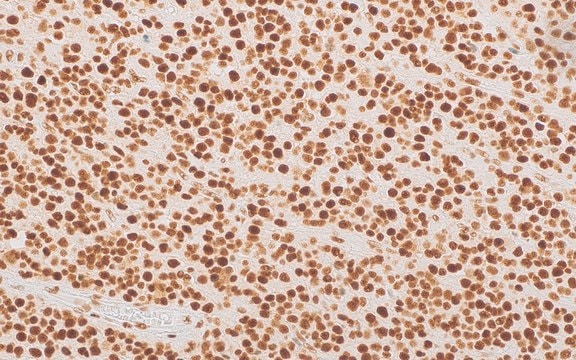MAB837
Anti-Papillomavirus Antibody, 1, 6, 11, 16, 18, 31, clone 1H8
clone 1H8, Chemicon®, from mouse
Synonym(s):
HPV
Sign Into View Organizational & Contract Pricing
All Photos(1)
About This Item
UNSPSC Code:
12352203
eCl@ss:
32160702
NACRES:
NA.41
Recommended Products
biological source
mouse
antibody form
purified antibody
antibody product type
primary antibodies
clone
1H8, monoclonal
species reactivity
human
manufacturer/tradename
Chemicon®
technique(s)
ELISA: suitable
immunohistochemistry: suitable
western blot: suitable
isotype
IgG
shipped in
wet ice
Specificity
Human papillomavirus proteins - HPV-1, HPV-6, HPV-11, HPV-16, HPV-18 and HPV-31.
Immunogen
Epitope: 1, 6, 11, 16, 18, 31
SDS-disrupted bovine papillomavirus type 1.
Application
Anti-Papillomavirus Antibody, 1, 6, 11, 16, 18, 31, clone 1H8 is an antibody against Papillomavirus for use in ELISA, WB, IH.
Immunohistochemistry
ELISA
Western Blot
Optimal working dilutions must be determined by end user.
ELISA
Western Blot
Optimal working dilutions must be determined by end user.
Research Category
Infectious Diseases
Infectious Diseases
Research Sub Category
Infectious Diseases - Viral
Infectious Diseases - Viral
Physical form
Format: Purified
Liquid in 0.02M PB 0.25M NaCl, and 0.1% sodium azide, pH 7.6.
Storage and Stability
Maintain at 2-8°C.
Other Notes
Concentration: Please refer to the Certificate of Analysis for the lot-specific concentration.
Legal Information
CHEMICON is a registered trademark of Merck KGaA, Darmstadt, Germany
Disclaimer
Unless otherwise stated in our catalog or other company documentation accompanying the product(s), our products are intended for research use only and are not to be used for any other purpose, which includes but is not limited to, unauthorized commercial uses, in vitro diagnostic uses, ex vivo or in vivo therapeutic uses or any type of consumption or application to humans or animals.
Not finding the right product?
Try our Product Selector Tool.
Storage Class Code
10 - Combustible liquids
WGK
WGK 2
Flash Point(F)
Not applicable
Flash Point(C)
Not applicable
Certificates of Analysis (COA)
Search for Certificates of Analysis (COA) by entering the products Lot/Batch Number. Lot and Batch Numbers can be found on a product’s label following the words ‘Lot’ or ‘Batch’.
Already Own This Product?
Find documentation for the products that you have recently purchased in the Document Library.
Identification of the bovine papillomavirus L1 gene product using monoclonal antibodies.
Cowsert, L M, et al.
Virology, 165, 613-615 (1988)
A A McBride et al.
Proceedings of the National Academy of Sciences of the United States of America, 97(10), 5534-5539 (2000-05-11)
Bovine papillomavirus type 1 (BPV-1) induces fibropapillomas in its natural host and can transform fibroblasts in culture. The viral genome is maintained as an episome within fibroblasts, which has allowed extensive genetic analyses of the viral functions required for DNA
L M Cowsert et al.
Journal of the National Cancer Institute, 79(5), 1053-1057 (1987-11-01)
Monoclonal antibodies (MAbs) were generated against sodium dodecyl sulfate-disrupted bovine papillomavirus type 1 (BPV-1). When screened by enzyme-linked immunosorbent assay (ELISA) on intact and disrupted BPV-1, -2, and deer papillomavirus, three patterns of reactivity were defined: reactivity only with intact
Determinants of autoantibody induction by conjugated papillomavirus virus-like particles.
Bryce Chackerian, Petra Lenz, Douglas R Lowy, John T Schiller
Journal of immunology (Baltimore, Md. : 1950) (1950)
Anna Yemelyanova et al.
Modern pathology : an official journal of the United States and Canadian Academy of Pathology, Inc, 26(2), 268-274 (2012-09-22)
While cervical cancer screening relies on cervical cytology and high-risk human papillomavirus (HPV) detection, the histologic diagnosis, and specifically lesion grade, is the main parameter that drives clinical management of screen-positive women. Morphologically diagnosed squamous intraepithelial lesions (SIL/CIN) regress spontaneously
Our team of scientists has experience in all areas of research including Life Science, Material Science, Chemical Synthesis, Chromatography, Analytical and many others.
Contact Technical Service



